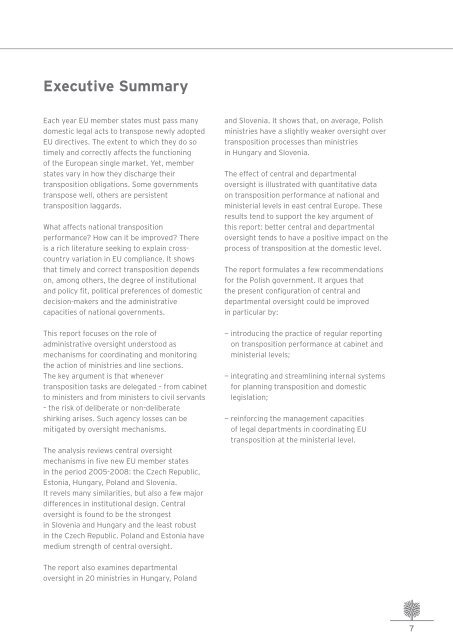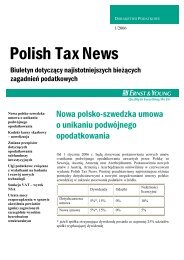Complying with EU Law: - Ernst & Young
Complying with EU Law: - Ernst & Young
Complying with EU Law: - Ernst & Young
You also want an ePaper? Increase the reach of your titles
YUMPU automatically turns print PDFs into web optimized ePapers that Google loves.
Executive SummaryEach year <strong>EU</strong> member states must pass manydomestic legal acts to transpose newly adopted<strong>EU</strong> directives. The extent to which they do sotimely and correctly affects the functioningof the European single market. Yet, memberstates vary in how they discharge theirtransposition obligations. Some governmentstranspose well, others are persistenttransposition laggards.What affects national transpositionperformance? How can it be improved? Thereis a rich literature seeking to explain crosscountryvariation in <strong>EU</strong> compliance. It showsthat timely and correct transposition dependson, among others, the degree of institutionaland policy fit, political preferences of domesticdecision-makers and the administrativecapacities of national governments.This report focuses on the role ofadministrative oversight understood asmechanisms for coordinating and monitoringthe action of ministries and line sections.The key argument is that whenevertransposition tasks are delegated – from cabinetto ministers and from ministers to civil servants– the risk of deliberate or non-deliberateshirking arises. Such agency losses can bemitigated by oversight mechanisms.The analysis reviews central oversightmechanisms in five new <strong>EU</strong> member statesin the period 2005-2008: the Czech Republic,Estonia, Hungary, Poland and Slovenia.It revels many similarities, but also a few majordifferences in institutional design. Centraloversight is found to be the strongestin Slovenia and Hungary and the least robustin the Czech Republic. Poland and Estonia havemedium strength of central oversight.and Slovenia. It shows that, on average, Polishministries have a slightly weaker oversight overtransposition processes than ministriesin Hungary and Slovenia.The effect of central and departmentaloversight is illustrated <strong>with</strong> quantitative dataon transposition performance at national andministerial levels in east central Europe. Theseresults tend to support the key argument ofthis report: better central and departmentaloversight tends to have a positive impact on theprocess of transposition at the domestic level.The report formulates a few recommendationsfor the Polish government. It argues thatthe present configuration of central anddepartmental oversight could be improvedin particular by:− introducing the practice of regular reportingon transposition performance at cabinet andministerial levels;− integrating and streamlining internal systemsfor planning transposition and domesticlegislation;− reinforcing the management capacitiesof legal departments in coordinating <strong>EU</strong>transposition at the ministerial level.The report also examines departmentaloversight in 20 ministries in Hungary, Poland7
















